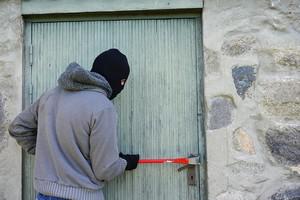CrimeCrime fighting got easier as burglars reveal all
The expertise of experienced burglars puts them streets ahead of householders, and even well ahead of other criminals, according to a new study. The results could lead to a step-change in how we fight this crime.

Burglar force-opening a door // Source: pixabay.com
The expertise of experienced burglars puts them streets ahead of householders, and even well ahead of other criminals, according to a new study.
The results could lead to a step-change in how we fight this crime. Dr. Claire Nee, of the University of Portsmouth, leading a team of international researchers from the Netherlands has pioneered the use of virtual environments to study crime.
In the first re-enactment of a burglary by experienced burglars, other criminals and those with no criminal experience, 160 people were asked to scout a virtual neighborhood, choose a house to burgle and burgle it.
Portsmouth says that the results revealed a striking degree of knowledge and skill by experienced burglars in choosing which home to target, how to navigate inside and what to take, revealing unprecedented insight into crime prevention.
Nee said: “This was the first study in the world to observe burglars as they scoped the neighborhood, and they covered significantly more ground in the same time as the other groups, appraising the rear of the properties and the ends of the terraces. Having entered their chosen property at the back, they quickly navigated upstairs to high value areas focusing on portable, expensive items such as jewelry, laptops and tablets and wallets.
“They were also much more efficient than other criminals and non-criminals, who were far less discriminate in what they stole and spent more time in lower value areas on the ground floor.
“The results showed clear differences in the way burglars navigate and process information in the neighborhood, compared to other criminals and non-criminals, which we will use to advise homeowners, the police and insurance companies in helping people protect themselves from crime.”
Nee said the use of virtual reality to observe offenders undertaking residential burglary is reaping rewards, giving researchers precise crime prevention information.
“Understanding their expertise is key to protecting yourself from this kind of criminal,” she said. “If we know experienced burglars tend to always do A and then B and then C, on their journey to crime and then inside the property, we can plan our environment and homes to disrupt the burglar, by not having a predictable layout or high value zones, for example.”
In the study, 56 experienced burglars, 50 other criminals, and 55 non-criminals took part in a mock burglary in a virtual neighborhood of terraced houses.
